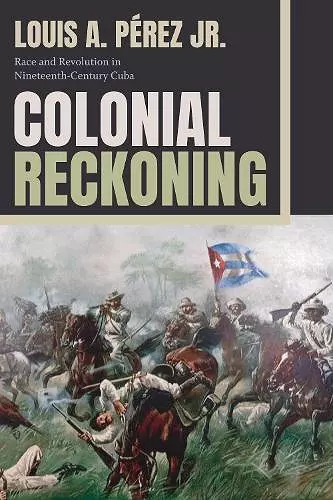Colonial Reckoning
Race and Revolution in Nineteenth-Century Cuba
Format:Hardback
Publisher:Duke University Press
Published:19th Dec '23
Currently unavailable, and unfortunately no date known when it will be back
This hardback is available in another edition too:
- Paperback£21.99(9781478032007)

In Colonial Reckoning Louis A. Pérez Jr. examines Cuba’s wars for independence in the second half of the nineteenth century, focusing specifically on those Cubans who remained loyal to Spain. Drawing on newspaper articles, personal letters, military battle reports, government commissions, consular reports, literature, and other materials, Pérez shows how everyday black, white, and creole Cubans defended the Spanish empire as paramilitary guerrillas alongside white elites. These loyalist Cubans helped the Spanish fight a separatist insurgency composed of a similarly diverse population of Cubans. Pérez demonstrates that these wars were so deadly and drawn out precisely because Cubans fought on both sides, each holding myriad competing visions of sovereignty and contested meanings of nation. Complicating mythical and historiographical narratives that Cuban national liberation was a struggle waged between Cubans of color and white elites beholden to Spain, Pérez shows that the fight consisted of a great number of factions with unique and evolving motivations. In so doing, he interrogates anew the multifaceted social dimensions and multiple political aspects of the complex drama of Cuban national formation.
“A work of deep reflection and wide research, Colonial Reckoning proposes a new framework for understanding the nineteenth-century Cuban wars for independence. Louis A. Pérez Jr. demonstrates that these were in many ways civil wars, during which Spain recruited tens of thousands of Cubans to fight against the insurrection and for the maintenance of Spanish sovereignty. Pérez argues that there emerged after independence a fractured nationality in which a seemingly disloyal portion of the population was figuratively written out of membership in the nation. That habit of mind, he suggests, at times emerges in different forms in Cuba today.” -- Rebecca J. Scott, author of * Degrees of Freedom: Louisiana and Cuba after Slavery *
“Louis A. Pérez Jr. accomplishes what few authors do when covering such well-known topics as Cuban independence: he takes a story we know well and not only provides a new interpretation depth of analysis but reframes it to show that independence was as much a civil war to the death between Cubans as it was a call for Cuba Libre.” -- Matt D. Childs, author of * The 1812 Aponte Rebellion in Cuba and the Struggle against Atlantic Slavery *
"An accomplished historian, Pérez shows that Cuba’s heroic mythology of national liberation often omits the messy fact that many Cubans—white and Black—aligned with the colonialists, first from Spain and later from the United States." -- Richard Feinberg * Foreign Affairs *
"Pérez successfully complicates long-held and relatively unquestioned historiographical assumptions while foregrounding a series of frequently overlooked factors: the precarious balance of political, economic and social forces undergirding Spain’s authority over Cuba . . . . Pérez’ book, in short, manages to enrich a somewhat petrified historical narrative, adding subtlety and ambiguity to an inherited, mythical tale of heroes and villains drawn mostly in black and white." -- Alejandro Quintero Mächler * ReVista *
ISBN: 9781478020684
Dimensions: unknown
Weight: 544g
288 pages